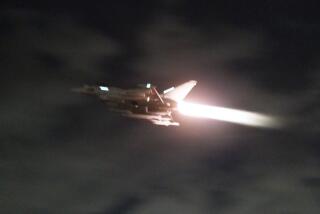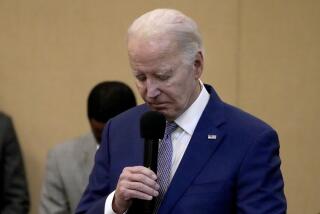CIA Chief Offers Gloomy View of War Prospects
- Share via
WASHINGTON — CIA Director William H. Webster, in a gloomy assessment of the prospects that the Persian Gulf crisis can be resolved short of war, Thursday stressed the danger of Iraq’s continuing military buildup and the possibility that the United States and its allies eventually will launch a military attack on Iraqi forces.
Declaring that a military offensive “might be precipitated by a range of possible causes,” Webster said that “there are a lot of people over there who would like to see this thing come to a head and not stretch out over a long-term economic solution.”
Iraq’s deployment of “substantial” numbers of additional troops in Kuwait along the Saudi border during the last three weeks, he said, has been “designed to attract a ground war in which high casualties” would be the cost of any attempt to drive Iraqi forces out of Kuwait.
Suggesting that Saddam Hussein is unlikely to withdraw Iraqi troops from Kuwait unless forced out militarily, Webster said that the Iraqi dictator “has so tied himself to the mast” that to leave voluntarily would be “a humiliating defeat.”
Webster’s assessment, in a question-and-answer session after a speech to the National Council of World Affairs Organizations, came amid increasing congressional concern that U.S. forces may launch a military offensive against Iraq some time after Congress adjourns next week for the rest of the year.
Defense Secretary Dick Cheney’s announcement Thursday that the United States plans to send as many as 100,000 additional troops to Saudi Arabia adds to those concerns, even though Cheney denied that the expanded buildup signals a plan to attack Iraq.
The United States already has 210,000 troops in place in the Persian Gulf region, and Cheney has acknowledged that the force is sufficient for defensive purposes. President Bush deployed U.S. forces to the region to protect Saudi Arabia from possible attack after Iraq’s Aug. 2 invasion of Kuwait.
While Bush has said that the forces are there to defend Saudi Arabia and the United States is relying on economic sanctions to force Iraq to withdraw from Kuwait, he has made a point of not ruling out a military option if the sanctions fail to achieve that objective.
Meanwhile, the President has kept members of Congress largely in the dark about the conditions under which the Administration might decide to launch a military offensive against Iraq. And in closed-door briefings with members of Congress on Wednesday, Cheney and Secretary of State James A. Baker III did nothing to dispel the growing frustration on Capitol Hill.
“They didn’t tell us very much, and what they did tell us, we already knew a month ago,” complained Rep. Nancy Pelosi (D-San Francisco). “If you had gone to sleep for a month and then had awakened in that room, you would have thought that you had just taken a 10-minute nap.”
Sen. Herbert Kohl (D-Wis.), a member of the Senate Foreign Relations Committee, said that members were told “nothing that you haven’t read in the newspaper or seen on television. . . . We tried to probe them about why we are there and how many troops we may send, and they said the same things they’d been saying all along.”
In addition to complaints about a lack of substantive consultations, several members of Congress, including Sen. Richard G. Lugar (R-Ind.), ranking Republican on the Senate Foreign Relations Committee, said they now think war is inevitable.
Sen. Warren B. Rudman (R-N.H.), a member of the defense subcommittee of the Senate Appropriations Committee, said that he sees “a very high likelihood there will be hostilities” but noted that lawmakers must be “extremely cautious about discussing” the chances of war.
“Most of us are extraordinarily concerned about debating this question publicly,” he said. “We’re between a rock and a hard place in this situation, with close to a quarter of a million of our men at risk. A lot of private debate is going on, between the Administration and Congress and amongst ourselves. But inevitably, if we discuss this thing publicly, people can put together conclusions about what some of us know.”
Although he declined to elaborate, Rudman said that based on what he has learned, he believes he knows which option the United States is more likely to pursue. But “we don’t get any indication what the timing is.”
Brent Scowcroft, Bush’s national security adviser, said almost a month ago that if Iraq continued its dismantling of Kuwait, it could shorten the timetable for exercising a possible military option in the gulf. Iraq, however, has continued to dismantle the country, even taking apart its seawater desalination plant, and U.S. officials have said nothing further about the effect of those actions on U.S. military policy.
U.S. officials also have suggested that mistreatment of American hostages in Kuwait and Iraq could provoke a military attack. And a State Department official said Thursday that British and French authorities have been asked to share any information they may learn from recently freed hostages about the conditions under which Westerners are being held as “human shields” at potential military targets in Iraq.
The official said that the United States was “taken by surprise” by the comments of a former British hostage, Jim Thomson, who said in interviews that hostages held at a chemical weapons plant near Baghdad had staged a riot to protest poor food and mistreatment.
Thomson is the first “human shield” known to have been released. The U.S. official, however, said it is likely that other persons who had been held at military targets were included in the release of British and French hostages. None of the 109 Americans known to have been sent to military facilities have been either released or visited by U.S. diplomats.
CIA Director Webster said that economic sanctions imposed by the United States and its allies and supported by U.N. resolutions have hurt Iraq, cutting off 98% of its exports of oil. But he said the sanctions have had little or no effect on Iraq’s military.
Webster said there have been “encouraging signs of dissatisfaction” among the Iraqi population.
“But we had all that in spades in Panama but it took something else to bring change,” he said, alluding to the U.S. invasion of the Central American nation last December to topple dictator Manuel A. Noriega.
The Iraqis, Webster said, are capable of operating effectively in a war environment that includes possible deployment of chemical weapons and he warned that Hussein would “have no hesitancy” to use such weapons, either defensively or in a preemptive strike.
Even in the unlikely event that Iraq withdraws from Kuwait, Webster said, there would be no guarantee of security in the Persian Gulf as long as Hussein remains in power, unless he faces “a countervailing force or was disassociated from his weapons of mass destruction.”
The massive American buildup in the gulf has resolved any doubts within the Arab world about whether the United States will stand behind a long-term commitment there, he said. At the same time, it has raised new questions among the Arabs about how long the massive contingent of U.S. forces will remain in the region, he said.
In recent days, senior Administration officials have said that they are beginning to draft plans designed to assure the security and stability of the region after an eventual departure of U.S. troops. If Hussein were to remain in power, the officials said, such measures would have to include a new initiative to restrict transfers of missile, chemical and nuclear weapons technology to Iraq.
Times staff writers Michael Ross, Norman Kempster and Maura Reynolds contributed to this report.
More to Read
Sign up for Essential California
The most important California stories and recommendations in your inbox every morning.
You may occasionally receive promotional content from the Los Angeles Times.










